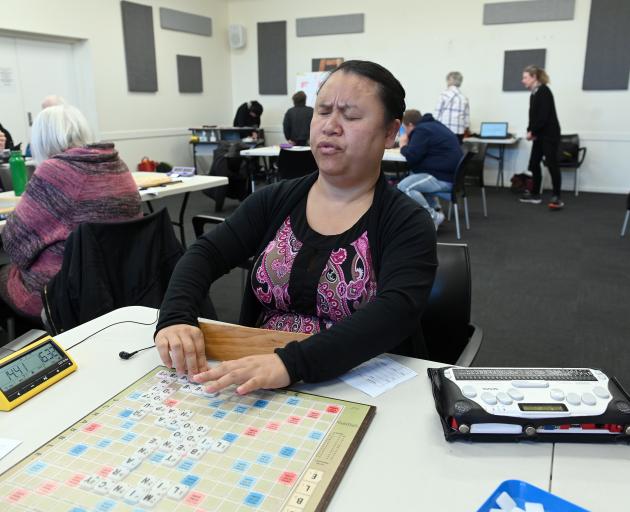
The school guidance counsellor and mother of four was one of more than 30 people who participated in a two-day competitive Scrabble tournament as part of National Scrabble Day in the South Dunedin Labour Party rooms over the weekend.
Ms En, who has been blind since she was 18 months old, uses a braille Scrabble board, braille tiles, a braille tablet to keep her score and track which tiles had been played, and a tactile clock.
She began playing at a competitive level in the early 2000s when studying at the University of Otago, but has been interested in Scrabble since she was 6.
"I'm someone who loves word patterns, she said.
"There’s a lot of thinking and a lot of strategy, it’s the perfect balance of luck and skill.
"One of the things I'm good at is remembering and analysing the shape of the games: some are expansive and some are very cluttered."
As in chess, competitive Scrabble is played with a clock, generally with 25 minutes per player.
She participated in 16 games over the weekend.
"That sounds like a lot, but it’s also my happy place.
"When you're playing Scrabble, you have no room to think of anything else, you don't have time to think about work or study.
"At the end of a tournament, I'm tired, but I'm also restored."
Ms En, who now lives in Palmerston North, said the Scrabble community had been really good to her.
"The great thing about it is that I can find players anywhere, and make some wonderful friends."
She finished second overall in the Dunedin tournament, and was most pleased with her use of the word "emptier" in one game, which got her 163 points.
"It’s always really satisfying to get those big words out there."
Dunedin Scrabble Club president Ruth Groffman said there had been a resurgence of interest in the game, and she was pleased with the weekend turnout.
Participants came from all over the country to participate in the weekend tournament in Dunedin.
Similar tournaments were also held in Auckland, Christchurch, Hamilton and Golden Bay at the same time over the weekend.
"It’s very tactical.
"Sure, you can memorise all the words, but it’s more about knowing the little ones — the more words you can make in a single move will be what gets you the win.
"We've got some A-grade players here.
"The key is to learn all the small words, and just practice constantly."












